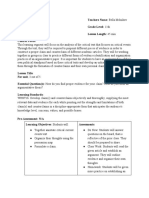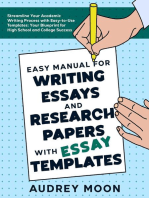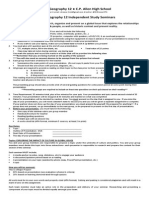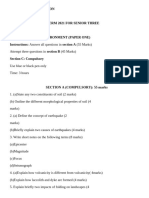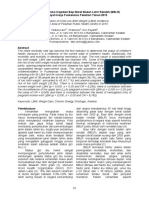0 ratings0% found this document useful (0 votes)
8 viewsEngagement Points Guide
Uploaded by
avduongCopyright
© © All Rights Reserved
Available Formats
Download as DOCX, PDF, TXT or read online on Scribd
0 ratings0% found this document useful (0 votes)
8 viewsEngagement Points Guide
Uploaded by
avduongCopyright
© © All Rights Reserved
Available Formats
Download as DOCX, PDF, TXT or read online on Scribd
You are on page 1/ 4
Engagement Points Guide
Most weeks, you will complete engagement points, including submitting drafts of your Essay
Components for 1 point each. For each Essay Component, you will complete a piece of writing
that will contribute to your final essay submission.
Engagement points are graded on a 0 (not completed OR not completed to
satisfaction/mastery) or 1 (completed to satisfaction/mastery). If you are confused by your
feedback or need more support, it is your responsibility to ask your TA or instructor for
assistance!
Detailed instructions and deadlines for each Engagement Point are listed below and included in
weekly posted content on eClass. Every week we will review the necessary related content and
material you will need to think about to complete each essay component more specifically.
Due May 13th to 17th, 11:59pm:
Pre-class survey and reflection (1 pt)
Essay Component 1 and 2
o EC1: Brainstorming: brief description of your topic(s) (~100 words or a short
paragraph).
Tell us about your possible essay topic idea. If you have multiple ideas you are
considering – tell us about all of them.
o It can be vague at this point – you don’t need a hyper-specific topic
yet. Just something to get you started on conducting research next
week.
o Think about: What makes you interested in this topic? What kind of
evidence or research do you think you might need to look for? Why is
this topic important to you?
Note: you should not have a definitive position on your topic yet! This means
you should not have already decided “I am going to argue that A causes B” –
we have not yet conducted research, so you don’t have any evidence to
support an argument yet.
You do not need to use any sources for EC1.
The purpose of this exercise is to make sure your ideas are on the right track,
not to judge whether your possible topics are ‘good’ or not – a topic is good is
it if meets the course requirements and will keep you interested all semester.
As long as it is interesting to you, it is fair game.
EC2: Working annotated bibliography of possible supporting evidence related
to your topic of interest. Find at least 4 scholarly references related to your
topic. For each of the 4 sources you must:
provide the full citation in correct APA format
summarize the source in your own words (may include some or all of
the following: hypotheses, methodology, results, implications)
note how the source is related to at least one of your other sources
(make links among your sources – for example: do they reach the
same or conflicting findings? Are they exploring a similar question but
in different populations? Is there a similar theme or concern being
addressed?)
o You do not need to link ALL articles together – for example,
article 1 is related to article 3, article 2 is related to article 3,
article 1 and 4 come to opposing conclusions, etc.
Each article summary and connections can be 1-2 paragraphs,
depending on how much you want to include.
Remember these summaries will inform your next Essay Component
(writing your supporting evidence) so the more work you do now to
understand the evidence on your topic, the easier the coming weeks
will be!
Due May 22nd, during class time, 9-11:30am
In-class live grading and peer review exercise of EC 3 and 4 (1 pt)
BONUS 1 pt: submit a full, complete EC3-4 to me by Tuesday, May 21 at 4pm as a
possible live grading recipient. Send to me via email.
o Note: this must be a complete draft. No half-done submissions will be given
credit.
Due May 20 – May 24th, 11:59pm
Essay Component 3 and 4 (1 pt each = 2 pts)
EC3: Claim and summary of your supporting evidence (~500-800 words)
Based on the evidence so far, what is your working claim?
o “I will argue that….”
o “My essay will make the claim that…”
o Note the phrasing above are just suggestions to get you started, you do not
have to use them – you can use your own words, as long as you are making a
clear argumentative statement.
o Format your claim in 1-2 sentences.
Next, describe the supporting evidence you have found so far. Write about the
evidence like it was your final essay.
o Use proper paragraphs and in-text citation.
o Ensure you describe how the evidence supports your claim – do not assume
your reader will make those connections!
o Go beyond mere summary – interpret the evidence and tell us why it matters
for your claim. Why are you including it in your essay?
o Absolutely no quotes! Use your own words and summarize/paraphrase the
evidence you are using.
EC4: Counter-claims to either your claim, supporting evidence, or both. You need 2
counter-claims and each counter-claim requires at least 1 source to support it. For
each counter-claim, you need a rebuttal, and your rebuttal also requires at least 1
source. (~500 words; can be longer if you need/want to)
Describe your 2 counterclaims (with arguments and evidence to support each, why
would someone believe/think these counterclaims in the first place? What is the
evidence for them?)
o Ensure each counter-claim has a source – you cannot invent a counter-claim!
Provide a rebuttal to each counterclaim using evidence. The rebuttals must describe
how your supporting evidence and/or claim are stronger or more convincing than
the counter-claim.
Write out your counter-claims and rebuttals like they were going into your final
essay.
o Use proper paragraphs and in-text citation.
o Like your supporting evidence, ensure you go beyond mere summary –
interpret the evidence and rebuttals and make clear how they are relevant
for your claim/supporting evidence, and why your claim still stands despite
the counter-claims.
Integrate your counter-claims and rebuttals into your claim and supporting evidence
from EC3! This will help us understand your counter-claims.
Due between June 3 and June 7, 11:59pm
Essay Component 5 and 6 (1 pt each = 2 pts)
EC5: Context/Introduction (~300-400 words)
Provide the introduction and relevant context for your essay.
Why is your topic and claim important? Why should we care?
When necessary, define terms in your essay (e.g. an important theory or concept
relevant to your claim and topic) and provide citations for any information that is
not your own.
Write your introduction in proper paragraph format, using in-text citations as
needed.
Don’t forget your claim – it should come close to the end of your introduction.
EC6: Conclusion of your essay (~200-400 words)
Your conclusion should guide the reader out of the essay. This is where you briefly
restate your claim/evidence and then put your claim again into the larger context of
your topic. What are the new possibilities now that your claim has been established?
If necessary, acknowledge limits to your argument without under-cutting yourself
(e.g. “We still need to learn more about X…”)
Include implications of your argument – what can we do with this information? Who
would it matter to? Implications should be the largest part of your conclusion.
Ensure your conclusion has a brief wrap-up statement(s) about your topic.
It is not sufficient to merely summarize your entire essay – this is not a conclusion!
Due June 10th, in-class 9:00-10:30am
Peer review (1 pt) – you will be matched with a peer to complete peer review.
o Note you MUST submit a full draft. No half-done work will be shared with a peer.
o You receive credit for completing peer review, not just uploading a draft to
share.
Due June 12th, in-class 9:00-11:00am
Attend final writing group and participate in goal-setting and reflection while completing
your final essay (1 pt)
Due June 17th, 11:59pm
Submit your final essay by 11:59pm so you can go on and enjoy your summer!
You might also like
- TOEFL Writing: Important Tips & High Scoring Sample Answers! (Written By A TOEFL Teacher)From EverandTOEFL Writing: Important Tips & High Scoring Sample Answers! (Written By A TOEFL Teacher)4.5/5 (6)
- English 1301 Syllabus: Dallas College, Richland Campus100% (1)English 1301 Syllabus: Dallas College, Richland Campus11 pages
- Understanding Essay Writing: A Guide To Writing Essays By Someone Who Grades ThemFrom EverandUnderstanding Essay Writing: A Guide To Writing Essays By Someone Who Grades Them4/5 (4)
- Unit Plan: Research Based Argumentative Essay Elisah Romero-Jones ENG 480 Arizona State University Spring 2017No ratings yetUnit Plan: Research Based Argumentative Essay Elisah Romero-Jones ENG 480 Arizona State University Spring 201724 pages
- Conquer the New SAT Essay: A Skilled Professor Teaches the 2016 SAT Essay SectionFrom EverandConquer the New SAT Essay: A Skilled Professor Teaches the 2016 SAT Essay Section2.5/5 (3)
- The Student’s Guide to Writing: Essential Outlines and StrategiesFrom EverandThe Student’s Guide to Writing: Essential Outlines and StrategiesNo ratings yet
- Hows It Goin Classroom Evaluation ResponseNo ratings yetHows It Goin Classroom Evaluation Response6 pages
- End of Semester Notes For English 101 (2024)No ratings yetEnd of Semester Notes For English 101 (2024)3 pages
- How to Write a Dissertation: An Instructional Manual for Dissertation Writers.From EverandHow to Write a Dissertation: An Instructional Manual for Dissertation Writers.No ratings yet
- Developing Creative Thinking to Improve Academic Writing: Part Two Advanced LevelFrom EverandDeveloping Creative Thinking to Improve Academic Writing: Part Two Advanced LevelNo ratings yet
- Agree or Disagree: 52 Writing Prompts for Opinion Essays: English Prompts, #2From EverandAgree or Disagree: 52 Writing Prompts for Opinion Essays: English Prompts, #2No ratings yet
- The Official Pocket Guide: Everything You Need to Know About Thesis StatementsFrom EverandThe Official Pocket Guide: Everything You Need to Know About Thesis StatementsNo ratings yet
- The Paper Protocol: Systematic Instructions for Writing a Biomedical Research PaperFrom EverandThe Paper Protocol: Systematic Instructions for Writing a Biomedical Research PaperNo ratings yet
- Culminating Task - Historical Inquiry ProjectNo ratings yetCulminating Task - Historical Inquiry Project9 pages
- Easy Manual for Writing Essays and Research Papers with Essay Templates: Essay Writing Study GuideFrom EverandEasy Manual for Writing Essays and Research Papers with Essay Templates: Essay Writing Study GuideNo ratings yet
- Preparing for the New York State Case Narrative Examination for the License in Psychoanalysis: An Unofficial GuideFrom EverandPreparing for the New York State Case Narrative Examination for the License in Psychoanalysis: An Unofficial GuideNo ratings yet
- Assignment 3 Annotated Bibliography 2025No ratings yetAssignment 3 Annotated Bibliography 20252 pages
- Gamut Barobo, Surigao Del Sur: En10Wc-Iih-13No ratings yetGamut Barobo, Surigao Del Sur: En10Wc-Iih-135 pages
- Global Geography 12 C.P. Allen High School Global Geography 12 Independent Study SeminarsNo ratings yetGlobal Geography 12 C.P. Allen High School Global Geography 12 Independent Study Seminars2 pages
- Writing Project 4: Argument Paper Overview:: Revised 04/17/2013 For Summer 2013No ratings yetWriting Project 4: Argument Paper Overview:: Revised 04/17/2013 For Summer 20136 pages
- How to Write an English Paper: Argue, Research, Format, and EditFrom EverandHow to Write an English Paper: Argue, Research, Format, and EditNo ratings yet
- UT Dallas Syllabus For Psy4375.001 06s Taught by Susan Jerger (Sjerger)No ratings yetUT Dallas Syllabus For Psy4375.001 06s Taught by Susan Jerger (Sjerger)3 pages
- Developing Creative Thinking to Improve Academic Writing: Part One Intermediate LevelFrom EverandDeveloping Creative Thinking to Improve Academic Writing: Part One Intermediate LevelNo ratings yet
- Standards Based Lesson Plan - Individual Lesson: Intern: Alyssa Ginzburg Grade Level: 6thNo ratings yetStandards Based Lesson Plan - Individual Lesson: Intern: Alyssa Ginzburg Grade Level: 6th3 pages
- Chapter 10_ Prosocial Behaviour - Why Do People HelpNo ratings yetChapter 10_ Prosocial Behaviour - Why Do People Help27 pages
- Chapter 11 - Aggression_ Why We Hurt Other PeopleNo ratings yetChapter 11 - Aggression_ Why We Hurt Other People27 pages
- Plastic surgery is a potent tool for women grappling withNo ratings yetPlastic surgery is a potent tool for women grappling with1 page
- The Impact of Migration On The Development and Spreading of Bantu LanguagesNo ratings yetThe Impact of Migration On The Development and Spreading of Bantu Languages6 pages
- Geography Physical and Human Exam of The Third Term 2021 For s3No ratings yetGeography Physical and Human Exam of The Third Term 2021 For s321 pages
- Business Negotiations - Unit 1 - Business Negotiations Week-1 QUIZ ANSWERSNo ratings yetBusiness Negotiations - Unit 1 - Business Negotiations Week-1 QUIZ ANSWERS3 pages
- Industrial Engineering Question Paper 2023No ratings yetIndustrial Engineering Question Paper 20232 pages
- 11 We'Ll Bite Your Tail, Geronimo by Stilton, GeronimoNo ratings yet11 We'Ll Bite Your Tail, Geronimo by Stilton, Geronimo133 pages
- Faktor-Faktor Risiko Kejadian Bayi Berat Badan Lahir Rendah (BBLR) Di Wilayah Kerja Puskesmas Pelaihari Tahun 2015No ratings yetFaktor-Faktor Risiko Kejadian Bayi Berat Badan Lahir Rendah (BBLR) Di Wilayah Kerja Puskesmas Pelaihari Tahun 20158 pages
- 340090-Causes and Effects of Sludge Formation in Motor OilsNo ratings yet340090-Causes and Effects of Sludge Formation in Motor Oils13 pages
- Self sensing concrete in smart structures 1st Edition Baoguo Han - Download the ebook today and own the complete content100% (2)Self sensing concrete in smart structures 1st Edition Baoguo Han - Download the ebook today and own the complete content65 pages
- Honey Powder Extract - LC-232267 - HC - He - F - 2023 - O2267No ratings yetHoney Powder Extract - LC-232267 - HC - He - F - 2023 - O22672 pages
- Kumasi Girls' Senior High School: Personal Records FormNo ratings yetKumasi Girls' Senior High School: Personal Records Form2 pages
- TOEFL Writing: Important Tips & High Scoring Sample Answers! (Written By A TOEFL Teacher)From EverandTOEFL Writing: Important Tips & High Scoring Sample Answers! (Written By A TOEFL Teacher)
- English 1301 Syllabus: Dallas College, Richland CampusEnglish 1301 Syllabus: Dallas College, Richland Campus
- Understanding Essay Writing: A Guide To Writing Essays By Someone Who Grades ThemFrom EverandUnderstanding Essay Writing: A Guide To Writing Essays By Someone Who Grades Them
- Unit Plan: Research Based Argumentative Essay Elisah Romero-Jones ENG 480 Arizona State University Spring 2017Unit Plan: Research Based Argumentative Essay Elisah Romero-Jones ENG 480 Arizona State University Spring 2017
- How to Write a Report: a Guide for College StudentsFrom EverandHow to Write a Report: a Guide for College Students
- Conquer the New SAT Essay: A Skilled Professor Teaches the 2016 SAT Essay SectionFrom EverandConquer the New SAT Essay: A Skilled Professor Teaches the 2016 SAT Essay Section
- Application Essays: A+ Guides to Writing, #12From EverandApplication Essays: A+ Guides to Writing, #12
- AP English Language and Composition Exam: Guide for EssaysFrom EverandAP English Language and Composition Exam: Guide for Essays
- The Student’s Guide to Writing: Essential Outlines and StrategiesFrom EverandThe Student’s Guide to Writing: Essential Outlines and Strategies
- Thesis Statement: How to Write a Good Thesis StatementFrom EverandThesis Statement: How to Write a Good Thesis Statement
- A+ Guide to Short Answer Essays: A+ Guides to Writing, #4From EverandA+ Guide to Short Answer Essays: A+ Guides to Writing, #4
- Modes of Writing: “A Beginner’S Tool for Writing Success”From EverandModes of Writing: “A Beginner’S Tool for Writing Success”
- How to Write a Dissertation: An Instructional Manual for Dissertation Writers.From EverandHow to Write a Dissertation: An Instructional Manual for Dissertation Writers.
- Developing Creative Thinking to Improve Academic Writing: Part Two Advanced LevelFrom EverandDeveloping Creative Thinking to Improve Academic Writing: Part Two Advanced Level
- Agree or Disagree: 52 Writing Prompts for Opinion Essays: English Prompts, #2From EverandAgree or Disagree: 52 Writing Prompts for Opinion Essays: English Prompts, #2
- The Official Pocket Guide: Everything You Need to Know About Thesis StatementsFrom EverandThe Official Pocket Guide: Everything You Need to Know About Thesis Statements
- The Paper Protocol: Systematic Instructions for Writing a Biomedical Research PaperFrom EverandThe Paper Protocol: Systematic Instructions for Writing a Biomedical Research Paper
- A+ Guide to Legal Case Briefs: A+ Guides to Writing, #8From EverandA+ Guide to Legal Case Briefs: A+ Guides to Writing, #8
- Your Amazing Itty Bitty TM Dissertation BookFrom EverandYour Amazing Itty Bitty TM Dissertation Book
- Easy Manual for Writing Essays and Research Papers with Essay Templates: Essay Writing Study GuideFrom EverandEasy Manual for Writing Essays and Research Papers with Essay Templates: Essay Writing Study Guide
- Preparing for the New York State Case Narrative Examination for the License in Psychoanalysis: An Unofficial GuideFrom EverandPreparing for the New York State Case Narrative Examination for the License in Psychoanalysis: An Unofficial Guide
- Global Geography 12 C.P. Allen High School Global Geography 12 Independent Study SeminarsGlobal Geography 12 C.P. Allen High School Global Geography 12 Independent Study Seminars
- Writing Project 4: Argument Paper Overview:: Revised 04/17/2013 For Summer 2013Writing Project 4: Argument Paper Overview:: Revised 04/17/2013 For Summer 2013
- How to Write an English Paper: Argue, Research, Format, and EditFrom EverandHow to Write an English Paper: Argue, Research, Format, and Edit
- UT Dallas Syllabus For Psy4375.001 06s Taught by Susan Jerger (Sjerger)UT Dallas Syllabus For Psy4375.001 06s Taught by Susan Jerger (Sjerger)
- Developing Creative Thinking to Improve Academic Writing: Part One Intermediate LevelFrom EverandDeveloping Creative Thinking to Improve Academic Writing: Part One Intermediate Level
- Standards Based Lesson Plan - Individual Lesson: Intern: Alyssa Ginzburg Grade Level: 6thStandards Based Lesson Plan - Individual Lesson: Intern: Alyssa Ginzburg Grade Level: 6th
- Chapter 10_ Prosocial Behaviour - Why Do People HelpChapter 10_ Prosocial Behaviour - Why Do People Help
- Plastic surgery is a potent tool for women grappling withPlastic surgery is a potent tool for women grappling with
- The Impact of Migration On The Development and Spreading of Bantu LanguagesThe Impact of Migration On The Development and Spreading of Bantu Languages
- Geography Physical and Human Exam of The Third Term 2021 For s3Geography Physical and Human Exam of The Third Term 2021 For s3
- Business Negotiations - Unit 1 - Business Negotiations Week-1 QUIZ ANSWERSBusiness Negotiations - Unit 1 - Business Negotiations Week-1 QUIZ ANSWERS
- 11 We'Ll Bite Your Tail, Geronimo by Stilton, Geronimo11 We'Ll Bite Your Tail, Geronimo by Stilton, Geronimo
- Faktor-Faktor Risiko Kejadian Bayi Berat Badan Lahir Rendah (BBLR) Di Wilayah Kerja Puskesmas Pelaihari Tahun 2015Faktor-Faktor Risiko Kejadian Bayi Berat Badan Lahir Rendah (BBLR) Di Wilayah Kerja Puskesmas Pelaihari Tahun 2015
- 340090-Causes and Effects of Sludge Formation in Motor Oils340090-Causes and Effects of Sludge Formation in Motor Oils
- Self sensing concrete in smart structures 1st Edition Baoguo Han - Download the ebook today and own the complete contentSelf sensing concrete in smart structures 1st Edition Baoguo Han - Download the ebook today and own the complete content
- Honey Powder Extract - LC-232267 - HC - He - F - 2023 - O2267Honey Powder Extract - LC-232267 - HC - He - F - 2023 - O2267
- Kumasi Girls' Senior High School: Personal Records FormKumasi Girls' Senior High School: Personal Records Form



























